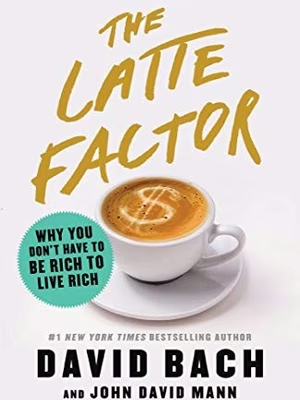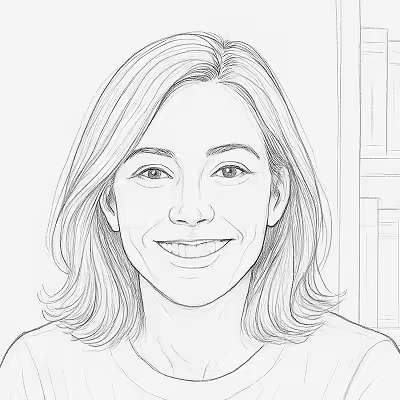Overview
The Latte Factor is not your typical finance book full of spreadsheets and tax codes. It’s a short story about Zoey Daniels, a twenty-something living in New York City. She works hard and earns a decent salary, yet she lives paycheck to paycheck, feeling stressed and trapped.
Through a chance meeting with Henry, an older barista who turns out to be financially free, Zoey learns a life-changing lesson: her problem isn't income, it's spending habits. The book explains that by cutting out small daily luxuries (like a latte) and investing that money instead, anyone can build wealth over time. I like this book because it makes investing feel accessible, proving you don't need a raise to start getting rich, you just need to look at your money differently.
My Take: The "Leak Detector" Approach
A lot of people hate this book’s title because they think, "I don't want to give up my coffee!" But my take is that the latte is just a metaphor. I treat this book as a "Financial Leak Detector."
When I read this, I stopped looking at my bank account and started looking at my trash can and my digital subscriptions. I realized I was "leaking" money on things that didn't bring me joy, like a streaming service I never watched or snacks I ate just because I was bored. The unique angle here isn't about deprivation; it's about redirection. I use the "Latte Factor" to find $10 a day that is being wasted and redirect it to something that grows.
Key Takeaways
Pay Yourself First
Most of us pay the government (taxes), our landlord, the phone company, and Netflix before we keep a dime. David Bach argues you must pay yourself first. Before you pay any bills, a portion of your income should go directly into an investment account that benefits you.
Don't Budget, Automate
Budgets rely on willpower, and willpower eventually runs out. The book teaches that the only way to stick to a savings plan is to make it automatic. If the money moves from your checking to your investment account before you can touch it, you won't miss it.
Compound Interest is Magic
The "Latte Factor" works because of compound interest. Saving $5 a day sounds small, but if you invest it at an average market return of 10%, it grows into hundreds of thousands (or even millions) over a few decades. Time matters more than the amount you start with.
Live Rich Now
The goal isn't just to be rich when you're 80. The book emphasizes figuring out what actually makes your life feel "rich" today, whether that's photography, travel, or art, and funding that dream. It’s about spending on what you love and ruthlessly cutting costs on what you don’t.
Chapter-by-Chapter Summary
Zoey's Struggle
We meet Zoey, an editor at a travel magazine. Even though she has a "cool" job, she is buried in credit card debt and student loans. She feels like she works just to pay bills. This section was relatable because it captures the modern feeling of "earning plenty but keeping nothing."
The Encounter with Henry
Zoey notices a beautiful photograph in a coffee shop and learns it was taken by Henry, the barista. She is confused, how can a barista afford to travel the world and take photos? Henry agrees to teach her his secret, which begins a series of morning conversations over coffee.
The First Secret: Pay Yourself First
Henry looks at Zoey's spending. He points out her morning latte, muffin, juice, and bottled water. He shows her that this $10–$20 daily habit is actually costing her over a million dollars in future wealth. He introduces the rule: You must secure the first hour of your daily pay for your future self.
The Second Secret: Don't Budget, Make It Automatic
Zoey argues that she can't budget because she's not good with math. Henry tells her that budgets don't work anyway. Instead, he explains how to set up automatic transfers so the money disappears into a retirement account the moment her paycheck hits. If you don't see it, you won't spend it.
The Third Secret: Live Rich Now
This was the emotional core of the book. Henry asks Zoey what she would do if she had all the money she needed. She admits she wants to study photography. Henry helps her see that she doesn't need to be a millionaire to start; she just needs to prioritize her spending to fund her passion today, not someday.
The Transformation
The story ends with a "fast forward" to the future. Zoey has followed the advice, automated her savings, and not only built wealth but also pursued her art. It serves as proof that the system works if you just stick to the basics and trust the math.
Main Concepts
The "Latte Factor" Explained
The "Latte Factor" is a metaphor for the small, unconscious spending we do every day. For Zoey, it was coffee. For me, it might be takeout food or online shopping. Bach's concept is that we claim we don't have enough money to invest, but we actually do, we are just spending it on things that don't add lasting value to our lives.
The "Broke" Mindset
- "I don't earn enough to save."
- Pays bills first, saves what is left (which is nothing).
- Relies on willpower to spend less.
- Thinks small purchases don't matter.
- Waits for a "big break" to get rich.
The "Latte Factor" Mindset
- "I have enough if I watch my small habits."
- Pays themselves first (automatically).
- Relies on systems to build wealth.
- Knows $10/day equals financial freedom.
- Starts today with whatever they have.
The Myth of the Big Income
One of the biggest ideas in the book is that high income does not equal wealth. You can earn $200,000 a year and still be broke if you spend it all. Conversely, you can earn $50,000 a year and become a millionaire if you automate your savings. This concept shifted my focus from "I need a raise" to "I need a system."
How to Apply the Ideas This Week
You don't need to understand the stock market perfectly to start using this book's advice. Here are a few practical steps you can take in the next 7 days to start building your own freedom.
- Track your spending for one day. Don't judge yourself, just track it. Write down every cent you spend for 24 hours. Look for your "Latte Factor", that $5 to $10 leak that you wouldn't really miss.
- Calculate the cost of your habit. If you find a $10 daily leak, multiply that by 365, then by 10 or 20 years. Realizing that your daily snack habit is worth $50,000+ over time is a powerful motivator.
- Set up one automatic transfer. Log into your bank and set up an auto-transfer of just $5 a day (or $35 a week) to a savings or investment account. Do it right now. The amount matters less than the habit.
- Identify your "Live Rich" dream. Ask yourself what you would do if you didn't have to work. Pick one small way to bring that into your life this week (e.g., taking photos, painting, or hiking) without spending a fortune.
Memorable Quotes
“The solution to your money problems isn’t more money; it’s new habits.”
“If you don’t know what matters to you, you’re just spending money on things that don’t.”
“You are richer than you think.”
Who I Think Should Read This Book
- Young professionals: If you just started your first job, this book is the perfect introduction to 401ks and savings without being boring.
- People who hate math: If spreadsheets make you dizzy, the story format of this book makes the concepts incredibly easy to digest.
- High earners who feel broke: If you make good money but wonder where it all goes at the end of the month, this book will help you plug the leaks.
- Anyone procrastinating on investing: If you are waiting for the "perfect time" to start investing, this book shows you why today is the only day that matters.
What Other Readers Are Saying
The Latte Factor has resonated with a huge audience because of its simplicity. On Amazon, it typically holds a rating of about 4.7 out of 5 stars. Readers love the parable format and say it finally motivated them to open an investment account after years of putting it off.
On Goodreads, it sits around 3.8 out of 5 stars. Some critical reviewers mention that the advice is very basic and that the "stop buying coffee" advice feels repetitive if you've read other finance books. However, most agree that for beginners, the storytelling makes the "medicine" of financial discipline go down much easier.
-
Read reviews on Amazon:
The Latte Factor on Amazon
* Affiliate link. I earn from qualifying purchases.
- Read reviews on Goodreads: The Latte Factor on Goodreads
Final Thoughts
Reading The Latte Factor reminded me that wealth isn't about hitting the lottery; it's about the boring, unsexy math of compound interest. It shifted my perspective from feeling deprived ("I can't buy this") to feeling empowered ("I'm choosing to buy my freedom instead").
If you use my "Leak Detector" take, you'll realize this book isn't asking you to never have fun. It's asking you to stop funding things you don't care about so you can fund the life you actually want. Start with $5 a day. Automate it. Then go live your life. That's a plan I can stick to.
Ready to Find Your Latte Factor?
This summary covers the main lessons, but the story itself is a quick, inspiring read that really drives the point home. If you want to master the details of the automation strategies, grab the full book.
Get The Latte Factor on Amazon* Affiliate link. I earn from qualifying purchases.

